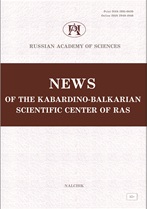|
This article is cited in 4 scientific papers (total in 4 papers)
System analysis, management and information processing
Development of a simulation model for predicting the behavior of an intelligent agent based on an invariant of a recursive
multi-agent neurocognitive architecture
I. A. Pshenokovaa, Z. A. Sundukovb
a Institute of Computer Science and Problems of Regional Management –
Branch of Federal public budgetary scientific establishment "Federal scientific center
"Kabardino-Balkarian Scientific Center of the Russian Academy of Sciences",
360000, KBR, Nalchik, 37-a, I. Armand St.
b FSBSE «Federal scientific center «Kabardino-Balkarian Scientific Center of the Russian Academy of Sciences», 360002, KBR, Nalchik, 2, Balkarova street
Abstract:
The active development of self-organizing decision-making and control systems based on the multi-agent approach has led to the fact that the concept of an intelligent agent is one of the main in the field of artificial intelligence. The paper presents the formalism of an intelligent agent based on multi-agent neurocognitive architectures. An intelligent agent is understood as an intelligent system based on a multi-agent neurocognitive architecture, which consists of software agents-neurons, the behavior of which is determined by an internal objective function, the implementation of which is carried out due to the ability of agents to interact with each other. An algorithm for learning an intelligent agent based on self-organization of an invariant of multi-agent neurocognitive architectures according to a scenario for predicting eating behavior is presented.
Learning based on the actual scenario of behavior allows the AI to predict and, in a preventive manner, prevent a decrease in its own energy to a critical value, signal the onset of hunger and satiety.
A simulation model of scenario prediction of the eating behavior of an intelligent agent based on an invariant of a multi-agent neurocognitive architecture has been developed. The use of rational software agents for modeling neural-like elements and organizing their multi-agent interaction in the process of teaching neurocognitive architecture based on the formation of axodendronal connections as part of control functional systems determines the scientific novelty of the result. Further development of the presented work is associated with teaching an intelligent agent more complex exploratory behavior.
Keywords:
simulation modeling, intelligent agent, multi-agent systems, neurocognitive architectures, self-learning systems.
Received: 20.11.2020
Citation:
I. A. Pshenokova, Z. A. Sundukov, “Development of a simulation model for predicting the behavior of an intelligent agent based on an invariant of a recursive
multi-agent neurocognitive architecture”, News of the Kabardino-Balkarian Scientific Center of the Russian Academy of Sciences, 2020, no. 6, 80–90
Linking options:
https://www.mathnet.ru/eng/izkab253 https://www.mathnet.ru/eng/izkab/y2020/i6/p80
|


| Statistics & downloads: |
| Abstract page: | 106 | | Full-text PDF : | 46 | | References: | 29 |
|



 Contact us:
Contact us: Terms of Use
Terms of Use
 Registration to the website
Registration to the website Logotypes
Logotypes